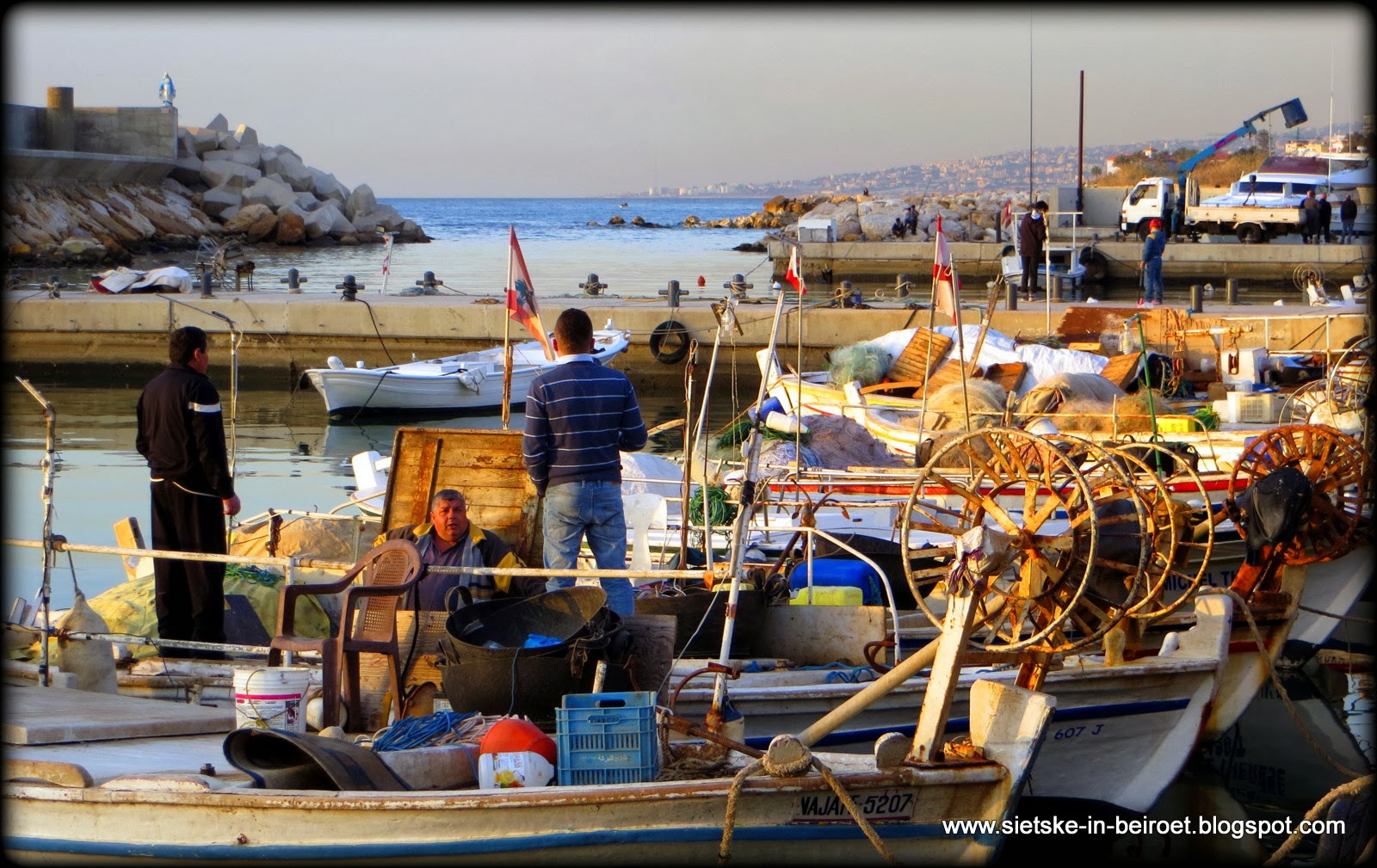I
ran into the little fishermen port of Bouar last Saturday (between Nahr Ibrahim
and Jounieh). I drive that road often, but for some reason I had never noticed
it until yesterday. It was late afternoon, the light was gorgeous, I had time,
my daughter wanted to see the boats, and so we stopped.
Some
men were working on a boat engine while others were fixing nets, and one man
was gutting some type of clam.
Fishing
is not a big business in Lebanon. The boats are small, the catch is small and
the income even smaller. While looking for information on this port, I stumbled
upon a few interesting reports on the fishing business in Lebanon. They come
from the Food and Agricultural Organization of the United Nations and local
newspapers, and the overall consensus of the Lebanese fishermen is basically
that
1)
they are among the poorest in the
nation, and
2)
their industry is on the verge of
collapse.
‘It is a
family based fishery, where the owners of the vessels, are directly involved in
the fishing activity, with the assistance of family members, there is a non
aging fishers’ population, and a low level of education. The income per
fisher-owner (7,400 USD) and fisher (3,000 USD) is 20% and 70% respectively
less than the national GDP per capita, furthermore a fisher earns about 25% less
than the minimum wage of the country. In this respect the fishers in Lebanon
are present in both the lower-middle class (fisher-owners) and the lower class
(fisher), where the latter are part of the poorest section of society.’ (Sources mentioned below)
Fishing in Lebanon is done only on the
coast, because it is illegal to fish beyond the 6 nautical mile limit. They
work in general without GPS or fish-finding radars, have small vessels, and catch
whatever happens to swim into their nets, which are mainly (and I do not know
the Arabic names, somebody fill me in please) Spicara
maena, red pandora,
bogue and Caranx
crysos, which look like sardines to me, but I am probably wrong.
The report concludes that the salary of
the fishermen need to be increased, by either raising the price of fish (my
guess is people will stop buying, so that won’t work), or increasing their
catch. This ‘can be achieved by improving the sustainable exploitation of the
stocks and exploring the possibility to exploit new fishing grounds such as the
deep water grounds (> 200 m) and offshore waters for large (. . . ) species.’
Increasing their catch seems equally impossible
with the material they have. Besides,
the report itself states that ‘Mediterranean catches have decreased by 15%
since 2007 ‘ and that most of the fish stocks in the Mediterranean are either ‘fully
exploited or overexploited.’
How
much we catch in Lebanon is unclear, due to the fact that ‘Lebanon has stopped
sending data to FAO since 2006’. I liked
that phrase: “Lebanon has stopped sending data.’
Sometimes
I feel this is a bit of a clown country. The Ministry of Telecommunications ‘forgets’ to pay its Internet
bill, almost cutting us off from the rest of the world, the Ministry of Finance
does
not pay money that it owes to the electricity company, resulting in even
more power cuts, Lebanon’s Energy Ministry is frequently embroiled with
one if it’s electricity supplier over money, we print currency bills with a typo, and the Ministry of Agriculture
has ‘stopped
sending data’.
With
expertise like that, it makes me feel like I could almost do a better job running
a ministry than most ministers. Okay, with a budget of 13 million dollar, it may be a daunting affair to get the fishing
industry on its feet, but when I walk around the port of Bouar, I see lots of
possibilities .
The
place is absolutely idyllic, as far as I am concerned. A regular Positano,
with some minor changes and lots of help from Sipes. Fix up the restaurants around the edges, remodel a few of the houses into small Bed
& Breakfasts places or little hotels run by the local population, organize
fieldtrips for school children, plan fish cooking workshops at the port, and I
could think of quite a few other things.
Anyway.
So now you know about the port of Bouar. Worth a visit.








3 comments:
Fascinating subject, thanks for raising awareness to it. Gorgeous photos.
Thank you ! :) I probably should eat more fish though, and not the frozen kind of Bou Khalil.
There are several fishmongers across the street from the port who serve food. It's some of the best and cheapest seafood I have had here. There is one in particular that is family run, I don't know the name of the place but the owner's name is Bernard. His wife makes the best Fattoush, in my opinion that's the best salad with fried fish. You want fresh fish with some mezza, try any one of the fishmongers there, you will thank me; I hope!
Post a Comment